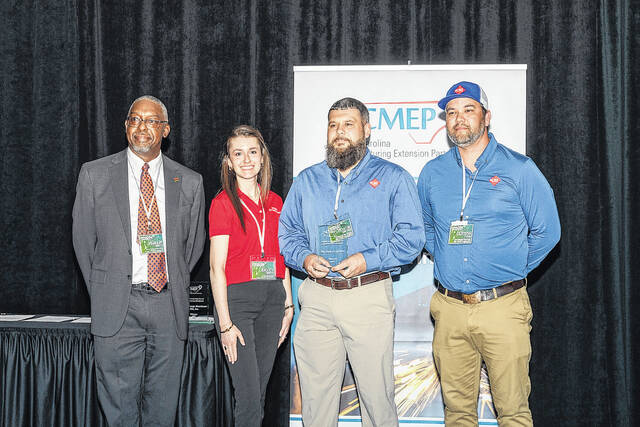
Shown from left, Phil Mintz, Executive Director Industry Expansion Solutions and North Carolina Manufacturing Extension Partnership (NCMEP); Bailey Smith, Extension Coordinator (Zeis Textiles Extension), NC State Wilson College of Textiles; Tyler Graves, Director of Operations; Clifton Dial, Operations Manager pose as We Pack is presented the NCMEP.
Courtesy photo | RichmondCC
HAMLET — We Pack Logistics received the North Carolina Manufacturing Extension Partnership (NCMEP) Manufacturing Leadership Award for Continuous Improvement at the 2025 North Carolina Manufacturing Conference, MFGCON, while also being asked to present at the conference to highlight its partnership with Richmond Community College.
The NCMEP Continuous Improvement Award is presented to the organization that exemplifies the use of systems of continuous improvement methodology that drive organizational behaviors aligned with a visual, detailed action plan and timeline following a scientific method. The company’s presentation was titled “Maximizing Community College Partnerships,” and centered around the various ways We Pack and RichmondCC work together to support one another.
“I’m very proud to highlight the strong partnership we have with We Pack Logistics, whose leadership is actively involved in all aspects of the College – from serving on our advisory council, to hiring our graduates and taking advantage of state-incentivized NC Edge customized training funds to support their local investments and growth,” said Richmond Community College President Brent Barbee. “The majority of leadership at both the College and We Pack are locally raised folks who are committed to working together to improve our hometowns and make our communities the best that they can be.”
In partnership with Richmond Community College, We Pack secured over $81,000 in funding, resulting in a capital investment of $1.4 million.
We Pack Logistics received the Customized Training Program funding in 2022 and began focusing on creating a culture of problem-solving and continuous improvement. The We Pack continuous improvement team started by assessing the current state of operations and identifying the necessity of taking a methodical approach to improve the current state of the business for future growth in a competitive market. Participants employed various lean tools, such as root cause analysis, kaizen events, Gemba walks, and, most importantly, employee feedback. This approach
fostered engagement and collaboration across departments, enabling the identification of opportunities that resulted in the development of best practices and enhanced efficiencies. The top three problems identified were:
— Conflict due to lack of communication and teamwork
— Downtime due to startup, extended breaks, lunch, changeovers and shutdowns
— Lack of structured rotation
After identifying the specific opportunities, the team was able to standardize and address the changes that were necessary to improve communications, teamwork, downtime, and rotation issues. In addition, We Pack Logistics’ leadership offered bonuses to line workers and line leaders to encourage participation in continuous improvement processes. By the end of 2024, as a result of the increased efficiencies, bonuses were paid to all team members.
A commitment to a continuous improvement program provides undeniable positive results and increased productivity. For example, in 2022, at the beginning of the program, one line at We Pack Logistics packed 745 units per hour, or 5,962 per shift. By mid-February 2025, the same line was packing 1,007 units per hour, or 8,057 per shift. By the end of 2025, the company aims to produce 10,000 cases per shift through an online-focused continuous improvement initiative.
We Pack implemented several actionable enhancements, focusing on ergonomics and safety. Key improvements included refining the orientation process and standardized communication through visual aids such as communication boards, line layout mapping and digital production trackers. The company reduced staffing by 15 percent while improving output.
“By taking a strategic approach to the improvement of our processes and people on our highest volume line, we were able to use the momentum from this success story to fuel future continuous improvement efforts across our facility,” said Clifton Dial, We Pack Operations Manager. The continuous improvement efforts have opened up opportunities for We Pack Logistics to procure other customers/products due to the efficiency and output possibilities.
